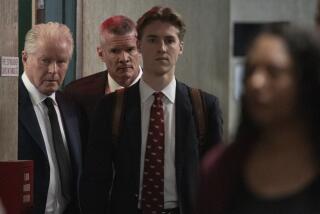Packwood Altered Memoir Tapes, Senate Lawyers Say : Ethics: Court is asked to seize recordings. Lawmaker is accused of unwanted sexual advances to many women.
- Share via
WASHINGTON — Sen. Bob Packwood (R-Ore.) altered tape recordings sought by the Senate Ethics Committee in its investigation of his conduct, lawyers for the panel said Tuesday. They asked a federal court to seize the tapes immediately.
The revelation came two days before a scheduled court hearing on whether Packwood should be compelled to comply with an Ethics Committee subpoena for tapes and transcripts of his memoirs from 1989 to the present. Neither Packwood nor members of his staff were available for comment.
“It is now apparent that the integrity of Sen. Packwood’s diary tapes and transcripts cannot be guaranteed,” Senate Legal Counsel Michael Davidson said in a memorandum filed with the U.S. District Court.
“The (Ethics) committee requests that the court direct that all subpoenaed material be placed immediately in the custody of the clerk of the court,” Davidson said, recalling a similar judicial action after the discovery of an 18 1/2-minute gap in a tape from the Richard Nixon White House during the Watergate investigation.
The committee said it needs immediate access to all the tapes under subpoena “to evaluate electronic and manuscript records to determine the extent and particulars of the alteration.”
Packwood, accused of making unwanted sexual advances to more than two dozen women over the last two decades, has asked the court to reject the subpoena on grounds that it would violate his constitutional right to privacy and Fifth Amendment protection against self-incrimination.
In documents filed Tuesday, lawyers for the ethics panel said testimony Friday from Packwood’s former secretary, Cathy Wagner Cormack, provided evidence that he had altered the tapes she was hired to transcribe.
“Subsequent to the initiation of the Ethics Committee investigation (in February), the senator took back some tapes in my possession which I had not yet transcribed,” she said in a sworn statement to the committee.
“At a later time, it appeared to me that he may have made some revisions to these tapes,” Cormack said. “Subsequently, he confirmed that he had. I do not know what changes he made or how extensive any changes were.”
The memorandum did not pinpoint the dates Packwood allegedly took back the tapes. Investigators are trying to establish a timetable.
If the tapes were taken after they were subpoenaed, the senator could face charges of obstruction of justice. If taken before the subpoena or before the committee expressed interest in them, the issue would be less clear.
In their legal memorandum, the Senate lawyers recalled a ruling by federal Judge John J. Sirica after discovery of the 18 1/2-minute gap in a tape made during a conversation in Nixon’s office. The tape had been subpoenaed by the Watergate prosecutor, who was investigating a White House cover-up of a burglary at Democratic Party headquarters during the 1972 Nixon reelection campaign.
In that investigation, the Senate brief said, Sirica asked the White House to turn over all of the original tapes to the court for safekeeping and examination by a panel of experts to determine whether they had been altered.
In the Packwood case, Senate attorneys also said the Oregon Republican improperly used Senate and later campaign funds to pay Cormack for transcribing the diaries.
Cormack worked in Packwood’s Senate office from 1969 to 1981, transcribing his tapes after regular working hours, she said in a deposition. That arrangement was apparently legitimate.
From 1981 to 1983, however, she worked for the Republican Senatorial Campaign Committee but still received $2,400 a year from Packwood’s office to transcribe diaries.
“The funds that Sen. Packwood used to compensate Ms. Cormack for transcribing his diaries were legally available for the payment only of expenses incurred for official governmental purposes,” said Victor Baird, chief counsel for the Ethics Committee.
From 1984 to the present, she told the committee, she was paid by the Reelect Packwood Committee up to $10,000 a year for transcribing the diaries.
“Under federal election campaign laws, campaign funds may not be converted to personal use,” Baird noted. Packwood has described the diaries as his personal memoirs.
The Senate brief also countered arguments by Packwood that the Fourth Amendment’s ban on unreasonable searches should protect his private diaries from scrutiny.
Noting that he had allowed lawyers for the committee to review 4,800 pages of his diaries covering 1969 to 1986, the Senate brief said: “Hoping not to get caught is not a privacy concern grounded in the Constitution.
“Sen. Packwood prefers to pretend that the committee has embarked on a fishing expedition, with neither anchor nor compass. As our sealed submissions reflect, nothing could be further from the truth.”
Packwood refused to permit access to his diaries after committee lawyers asked for copies of entries relating to his requests to lobbyists to provide jobs to his then-estranged wife, Georgie, apparently because he hoped to reduce prospective alimony payments.
The Senate voted, 94 to 6, earlier this year to support the Ethics Committee and authorize it to go to court to enforce the subpoena.
More to Read
Get the L.A. Times Politics newsletter
Deeply reported insights into legislation, politics and policy from Sacramento, Washington and beyond. In your inbox twice per week.
You may occasionally receive promotional content from the Los Angeles Times.










